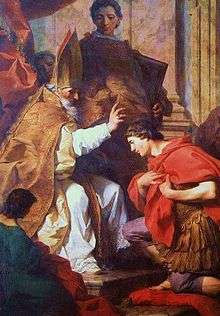386
Year 386 (CCCLXXXVI) was a common year starting on Thursday (link will display the full calendar) of the Julian calendar. At the time, it was known as the Year of the Consulship of Honorius and Euodius (or, less frequently, year 1139 Ab urbe condita). The denomination 386 for this year has been used since the early medieval period, when the Anno Domini calendar era became the prevalent method in Europe for naming years.
| Millennium: | 1st millennium |
|---|---|
| Centuries: | |
| Decades: | |
| Years: |
|
| 386 by topic |
|---|
| Leaders |
| Categories |
|
| Gregorian calendar | 386 CCCLXXXVI |
| Ab urbe condita | 1139 |
| Assyrian calendar | 5136 |
| Balinese saka calendar | 307–308 |
| Bengali calendar | −207 |
| Berber calendar | 1336 |
| Buddhist calendar | 930 |
| Burmese calendar | −252 |
| Byzantine calendar | 5894–5895 |
| Chinese calendar | 乙酉年 (Wood Rooster) 3082 or 3022 — to — 丙戌年 (Fire Dog) 3083 or 3023 |
| Coptic calendar | 102–103 |
| Discordian calendar | 1552 |
| Ethiopian calendar | 378–379 |
| Hebrew calendar | 4146–4147 |
| Hindu calendars | |
| - Vikram Samvat | 442–443 |
| - Shaka Samvat | 307–308 |
| - Kali Yuga | 3486–3487 |
| Holocene calendar | 10386 |
| Iranian calendar | 236 BP – 235 BP |
| Islamic calendar | 243 BH – 242 BH |
| Javanese calendar | 269–270 |
| Julian calendar | 386 CCCLXXXVI |
| Korean calendar | 2719 |
| Minguo calendar | 1526 before ROC 民前1526年 |
| Nanakshahi calendar | −1082 |
| Seleucid era | 697/698 AG |
| Thai solar calendar | 928–929 |
| Tibetan calendar | 阴木鸡年 (female Wood-Rooster) 512 or 131 or −641 — to — 阳火狗年 (male Fire-Dog) 513 or 132 or −640 |

Saint Ambrose converting Theodosius I
Events
By place
Roman Empire
- Emperor Theodosius I signs a peace treaty with King Shapur III; they divide Armenia into two kingdoms (vassal states). The treaty establishes friendly relations between the Roman Empire and Persia for the next 36 years.
- The Greuthungi cross the Danube to raid the Roman garrisons on the northern frontier. They are met midstream by a well-armed fleet, and their rafts and dugouts sink. Those not drowned are slaughtered.
- Magnus Maximus invades Italy; he destroys Novara for supporting his rival Valentinian II.
- Theodosius I begins to rebuild the present-day Basilica of Saint Paul Outside the Walls.
- A column is constructed at Constantinople in honour of Theodosius I. Reliefs depict the emperor's victory over the barbarians in the Balkan.
Asia
- The Northern Wei Dynasty begins in China.[1] The Tuoba clan of the Xianbei tribe (proto-Mongol people) is politically separated from the Chinese dynasties established in Jiankang (modern Nanjing). The Northern Wei rulers are ardent supporters of Buddhism. Prince Dao Wu Di, age 15, becomes the first emperor (see Northern dynasties).
By topic
Religion
- Saint Ambrose defends the rights of the Catholic Church with respect to those of the State.
- Theodosius I is converted to Christianity.
- John Chrysostom becomes a presbyter; he also writes eight Homilies entitled "Adversus Iudaeos" ("Against the Jews").
- Augustine converts to Christianity. He ends his marriage plans after hearing a sermon on the life of Saint Anthony.
- The fight in the Roman Empire against anti-pagan laws becomes increasingly futile.
- Sumela Monastery is established in Asia Minor.
Births
- Jin Gongdi, last emperor of the Jin Dynasty (d. 421)
- Nestorius, founder of Nestorianism (approximate date)
Deaths
- November 23 – Jin Feidi, emperor of the Jin Dynasty (b. 342)
- Cyril of Jerusalem, theologian and saint
- Demophilus, Patriarch of Constantinople
- Duan Sui, ruler of the Western Yan
- Fu Pi, emperor of the Former Qin
- Murong Chong, emperor of the Western Yan (b. 359)
- Murong Yao, emperor of the Western Yan
- Murong Yi, ruler of the Western Yan
- Murong Zhong, emperor of the Western Yan
- Pulcheria, daughter of Theodosius I (b. 385)
- Wang Xianzhi, Chinese calligrapher (b. 344)
- Yang, empress of the Former Qin
gollark: <@331320482047721472> Gaming?
gollark: How do I "gaming"?
gollark: Hi. I "exist".
gollark: Can I make a specialised mgollark instance take on my bridge roles?
gollark: I would need to download and install stuff? This may add time.
References
- Grousset, Rene (1970). The Empire of the Steppes. Rutgers University Press. pp. 60–65. ISBN 0-8135-1304-9.
This article is issued from Wikipedia. The text is licensed under Creative Commons - Attribution - Sharealike. Additional terms may apply for the media files.